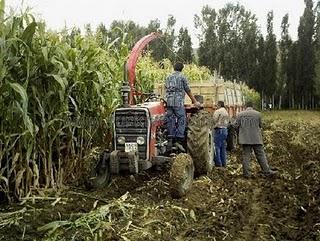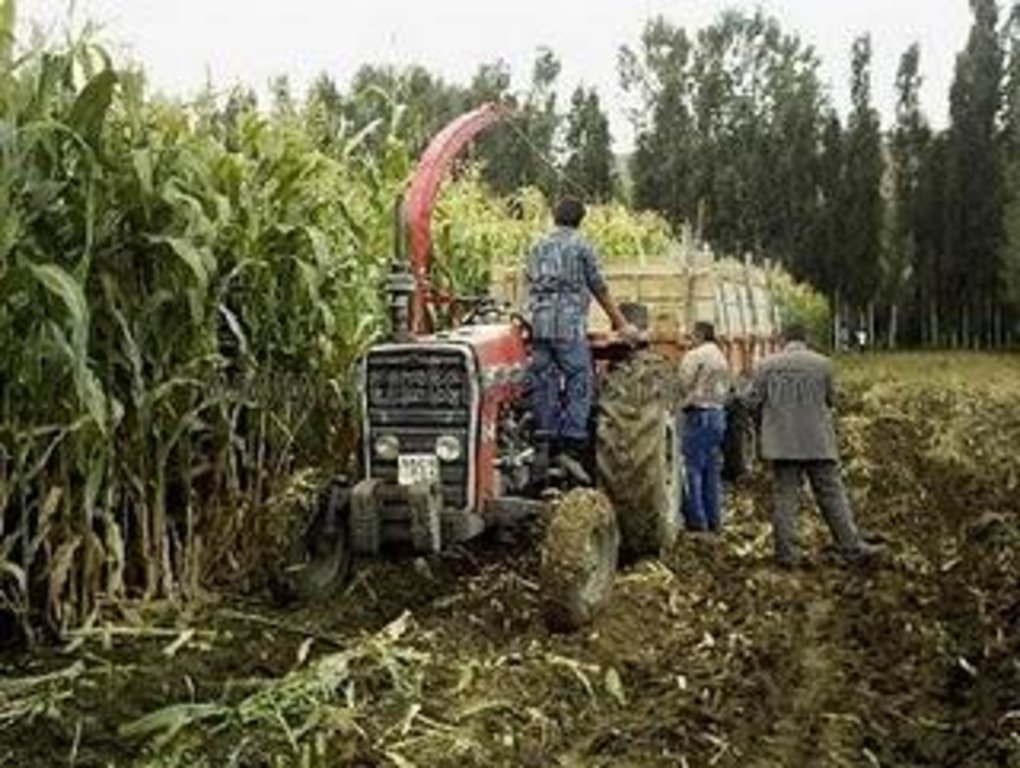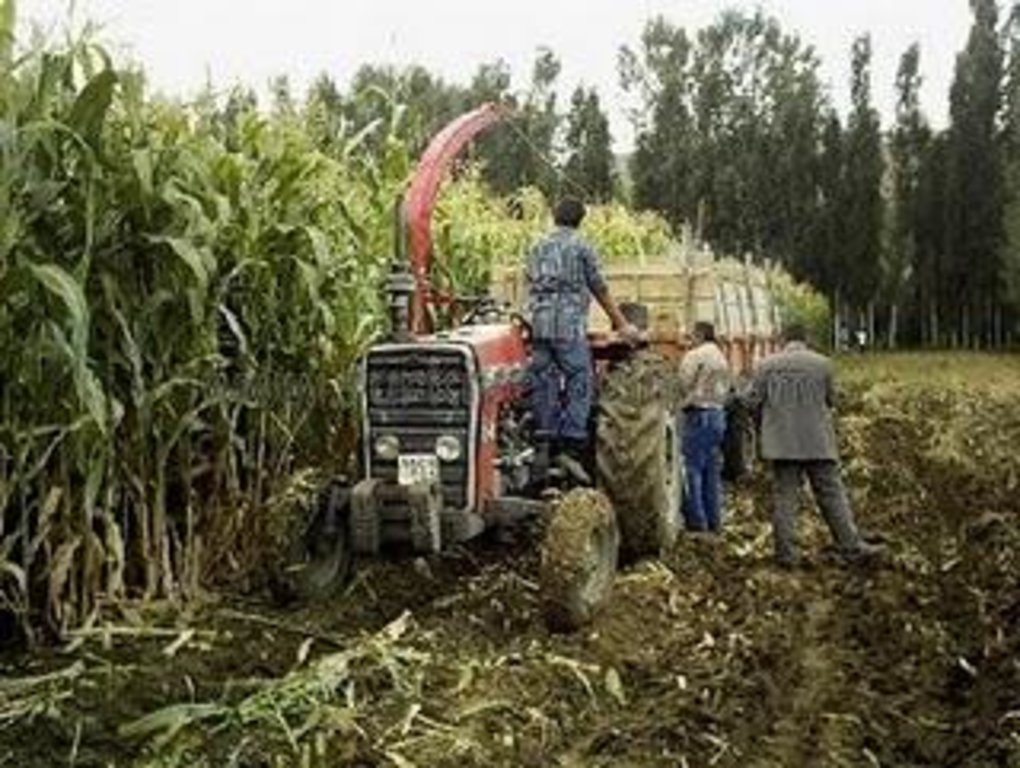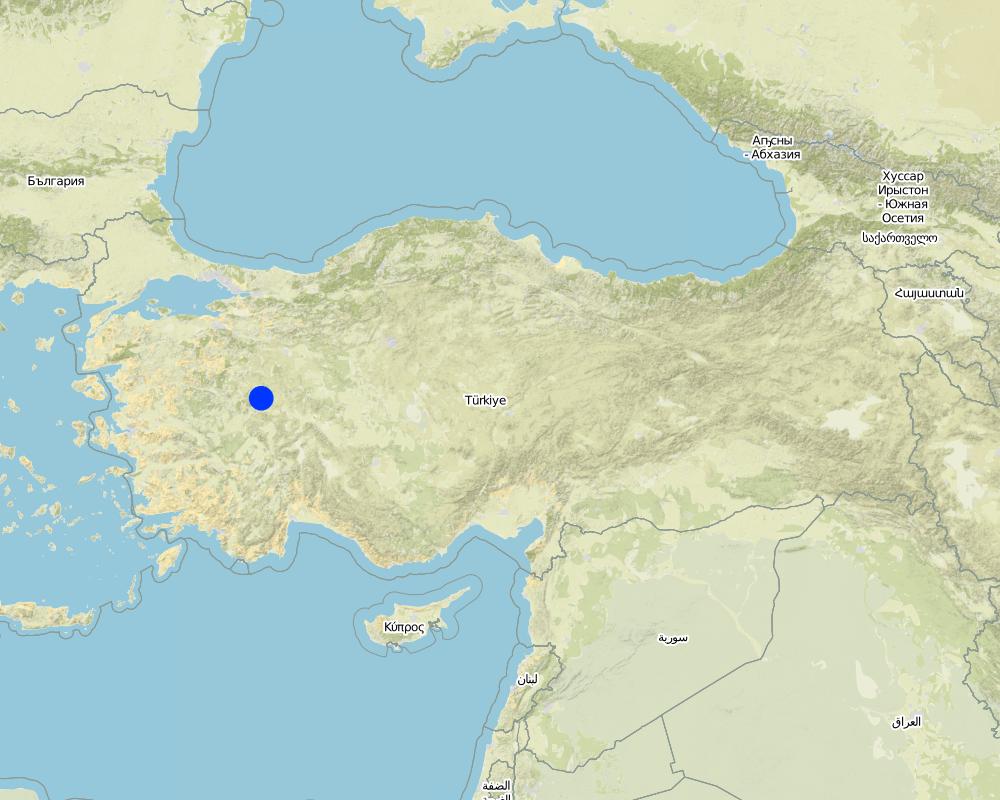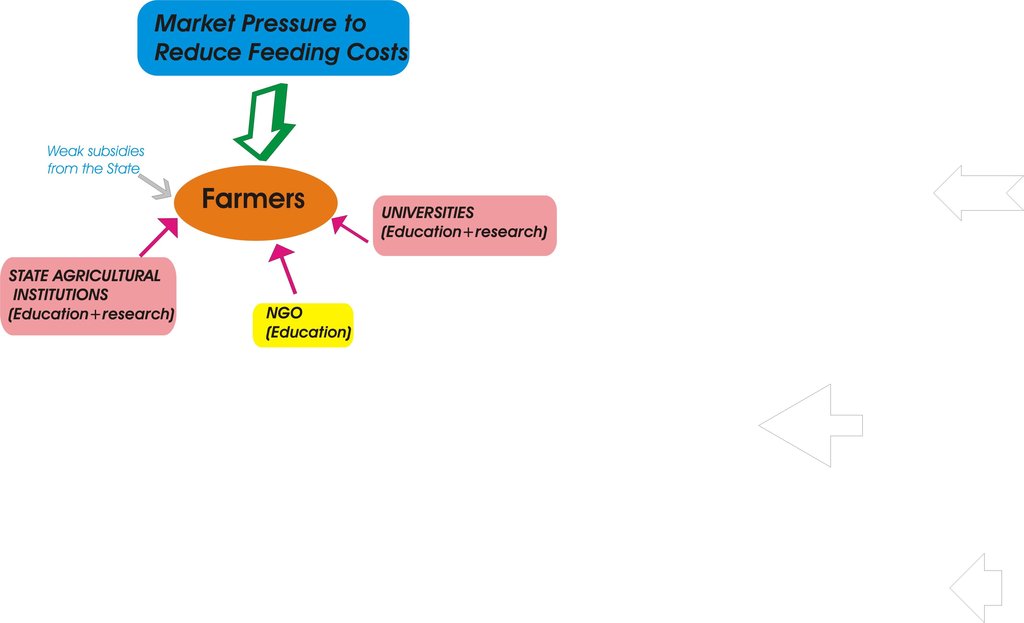Fodder Crops Production [Turquía]
- Creación:
- Actualización:
- Compilador: Unknown User
- Editor: –
- Revisor: Fabian Ottiger
approaches_2425 - Turquía
Visualizar secciones
Expandir todo Colapsar todos1. Información general
1.2 Detalles de contacto de las personas de referencia e instituciones involucradas en la evaluación y la documentación del Enfoque
Persona(s) de referencia clave/s
Especialista MST:
Tolay Inci
Turquía
1.3 Condiciones referidas al uso de datos documentados mediante WOCAT
El compilador y la/s persona(s) de referencia claves aceptan las condiciones acerca del uso de los datos documentados mediante WOCAT :
Sí
1.4 Referencia/s al/los Cuestionario(s) de Tecnologías MST
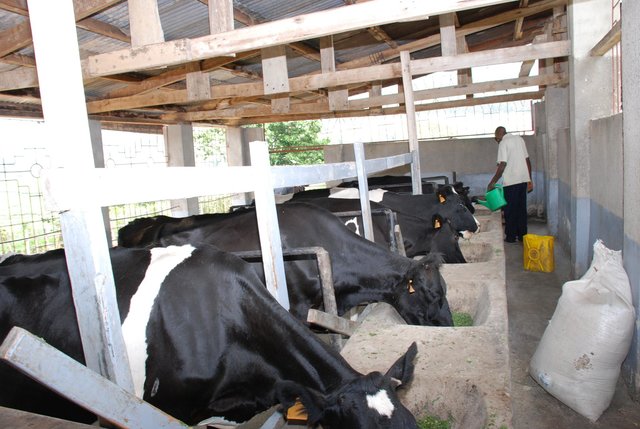
Dairy cattle fed with supplementary fodder [Uganda]
Elephant grass (Pennisteum purpureum) and calliandra (Calliandra calothyrsus), are harvested and chopped using a chaff cutter to produce fodder for dairy cows. The chaff is then mixed with cotton seed cake, molasses and maize bran to improve palatability and nutrient quality for dairy cows. The cattle graze in paddocks during …
- Compilador: Aine Amon
2. Descripción del Enfoque MST
2.1 Breve descripción del Enfoque
To grow different fodder crop species (leguminous and graminous) for feeding livestock
2.2 Descripción detallada del Enfoque MST
Descripción detallada del Enfoque MST:
Aims / objectives: It is aimed to grow livestocks feed for reduce costs of inputs in farms. Ease of feeding by this way is another motivation. Fodder crops especially leguminous ones are also very useful for improving and protecting soil fertility. Therefore farmers who produce both crops and livestock prefer to grow fodder crops.
Methods: Leguminous (alfaalfa, soinfoin, vetch) and graminous (corn for silage, barley, wheat, oat, triticale, rye) fodder species are grown in different growing seasons. Graminous fodder species are grown annually, among the leguminous species. Alfaalfa, sainfain are perennial and vetch is an annual species. The fodder species can be grown under dry conditions except corn. Leguminous species can not grow well if there is not enough rainfall; therefore they need irrigation. Application of the approach is mostly forced by market conditions where meat incomes were gradually decreasing in the last years due to macroeconomic policies. Training of the farmers is achieved by state institutions, universities and NGO's in a rather discontinous and sporadic way.
Stages of implementation: Soil tillage, fertilizing the soil, sowing the seeds, irrigation, harvest (1 for graminous species several times for leguminous species). Starting the approach by individual farmers is done by traditional communication and sometimes by training activities.
Role of stakeholders: All stages of the technology application are performed by participants. Technology is applied by farmers who have all the facilities needed for technology. They get some subsidizes from the state because of promoting the fodder crop production. State organisations, universities and NGO's provide irregular training courses and demonstrations. Rare scientific studies in terms of advantages of approcah are conducted by universities and state research institutes.
2.3 Fotos del Enfoque
2.5 País/ región/ lugares donde el Enfoque fue aplicado
País:
Turquía
Región/ Estado/ Provincia:
Turkey
Especifique más el lugar :
Keskin watershed, EskiÅŸehir
Map
×2.6 Fechas de inicio y conclusión del Enfoque
Indique año del inicio:
10
2.7 Tipo de Enfoque
- iniciativa local reciente/ innovadora
2.8 Propósitos/ objetivos principales del Enfoque
The Approach focused on SLM only
To reduce fodder input expenses by livestock producers.
The SLM Approach addressed the following problems: The problems to be addressed by the approach mainly arise from drought which increases recently. Because fodder crops production mainly relies on natural rainfall in the region. Also, lack of technical knowledge is another problem. Governmental unstability for subsiding fodder crops is also one of the problem for maintaining the approach.
2.9 Condiciones que facilitan o impiden la implementación de la/s Tecnología/s aplicadas bajo el Enfoque
normas y valores sociales/ culturales/ religiosos
- impiden
Education level of farmers is low and woman do not participate in performing approach.
Treatment through the SLM Approach: no solution yet.
disponibilidad/ acceso a recursos y servicios financieros
- impiden
Input casts are high.
Treatment through the SLM Approach: Government partly subsidizes crop production.
marco de trabajo legal (tenencia de tierra, derechos de uso de tierra y agua)
- impiden
Some of land use rights are belong to a foundation, because of that some of farmers can not got subsidizes given by government.
Treatment through the SLM Approach: No solution yet.
conocimiento de MST, acceso a apoyo técnico
- impiden
Some growing techniques are not known well.
Treatment through the SLM Approach: Farmers get some help from governmental institutions. But most of them are aware of this.
3. Participación y roles de las partes interesadas involucradas
3.1 Partes interesadas involucradas en el Enfoque y sus roles
- usuarios locales de tierras/ comunidades locales
Because of cultural, educational and social reasons there are differences between the genders. Women are not well educated and much more interested in house works and children.
Both small and large scale farmers apply technology for its benefit.
3.2 Involucramiento de los usuarios locales de tierras/ comunidades locales en las distintas fases del Enfoque
| Involucramiento de los usuarios locales de tierras/ comunidades locales | Especifique quién se involucró y describa las actividades | |
|---|---|---|
| iniciación/ motivación | auto-movilización | |
| planificación | auto-movilización | |
| implementación | auto-movilización | |
| monitoreo y evaluación | ninguno | |
| Research | ninguno |
3.3 Flujograma (si estuviera disponible)
3.4 La toma de decisiones en la selección de Tecnología(s) MST
Especifique quién decidió la selección de las Tecnología/ Tecnologías a implementarse:
- solamente usuarios de tierras (autoiniciativa)
Explique:
Decisions on the method of implementing the SLM Technology were made by by land users* alone (self-initiative / bottom-up)
4. Apoyo técnico, fortalecimiento institucional y gestión del conocimiento
4.1 Construcción de capacidades / capacitación
¿Se proporcionó la capacitación a usuarios de tierras/ otras partes interesadas?
Sí
Especifique quién fue capacitado:
- usuarios de tierras
4.3 Fortalecimiento institucional (desarrollo institucional)
¿Se establecieron o fortalecieron instituciones mediante el Enfoque?
- sí, un poco
Especifique el nivel o los niveles en los que se fortalecieron o establecieron las instituciones:
- local
Especifique el tipo de apoyo:
- financiero
4.4 Monitoreo y evaluación
¿El monitoreo y la evaluación forman parte del Enfoque?
Sí
Comentarios:
economic / production aspects were regular monitored by government, land users through measurements; indicators: amount of yield
area treated aspects were regular monitored by government through observations; indicators: for the subsidies
no. of land users involved aspects were ad hoc monitored by project staff through measurements; indicators: None
management of Approach aspects were None monitored by None through observations; indicators: None
There were few changes in the Approach as a result of monitoring and evaluation: Monitoring and evaluation activities have indirect and weak effect upon the approach since applicability of the approach is determined mostly by the demand of market.
There were few changes in the Technology as a result of monitoring and evaluation: Monitoring activities are mostly aimed to determine the subsidy payment but not to assess the efficacity of the technology. But the results of research projects is supposed to have a small impact upon the application of technology.
4.5 Investigación
¿La investigación formó parte del Enfoque?
Sí
Proporcione detalles adicionales e indique quién hizo la investigación:
Research was carried out on-farm
5. Financiamiento y apoyo material externo
5.1 Presupuesto anual para el componente MST del Enfoque
Si no se conoce el presupuesto anual preciso, indique el rango:
- 10,000-100,000
Comentarios (ej. fuentes principales de financiamiento/ donantes principales):
Approach costs were met by the following donors: government (as subsidies): 20.0%; local community / land user(s): 80.0%
5.2 Apoyo financiero/material proporcionado a los usuarios de tierras
¿Los usuarios de tierras recibieron financiamiento/ apoyo material para implementar la Tecnología/ Tecnologías? :
Sí
5.3 Subsidios para insumos específicos (incluyendo mano de obra)
- agrícola
| Especifique qué insumos se subsidiaron | En qué grado | Especifique los subsidios |
|---|---|---|
| semillas | parcialmente financiado | |
5.4 Crédito
¿Se proporcionó crédito bajo el Enfoque para actividades MST?
No
6. Análisis de impacto y comentarios de conclusión
6.1 Impactos del Enfoque
¿El Enfoque ayudó a los usuarios de tierras a implementar y mantener Tecnologías MST?
- No
- Sí, un poco
- Sí, moderadamente
- Sí, mucho
Land users apply crop rotation when they use the approach. Leguminous fodder species provide nitrogen to the soil. It improves soil fertility so help sustainable land management.
¿El Enfoque mejoró cuestiones de tenencia de tierra/ derechos de usuarios que obstaculizaron la implementación de la Tecnologías MST?
- No
- Sí, un poco
- Sí, moderadamente
- Sí, mucho
Did other land users / projects adopt the Approach?
- No
- Sí, un poco
- Sí, moderadamente
- Sí, mucho
Did the Approach lead to improved livelihoods / human well-being?
- No
- Sí, un poco
- Sí, moderadamente
- Sí, mucho
It moderately changed life quality by its ease in animal feeding and increase farm income.
6.2 Motivación principal del usuario de la tierra para implementar MST
- producción incrementada
Using fodder crops allow farmers to feed their animals better and hence rise the quality of feeding.
- incremento de la renta(bilidad), proporción mejorada de costo-beneficio
approach basically diminish the cost of feeding and allow use of domestic (own) resources.
- pagos/ subsidios
Central government gives significant subsidies.
- conciencia medioambiental
Farmers know that the fodder crops enrich the texture and chemistry of soil.
6.3 Sostenibilidad de las actividades del Enfoque
¿Pueden los usuarios de tierras sostener lo que se implementó mediante el Enfoque (sin apoyo externo)?
- incierto
Si respondió no o incierto, especifique y comente:
Governmental supports (subsidies) help to continue the approach. If subsidies are not given, land users can not afford easily the approach. Additionally, if the pressure of market is higher they might totaly abandon animal feeding.
6.4 Fortalezas/ ventajas del Enfoque
| Fuerzas/ ventajas/ oportunidades desde la perspectiva del usuario de la tierra |
|---|
| It guarantees feeding their livestock. They are not affected from fluctuation in the price and presence of fodders in the market. (How to sustain/ enhance this strength: By technical help.) |
| It reduces input costs. (How to sustain/ enhance this strength: By financial support of government.) |
| Fuerzas/ ventajas/ oportunidades desde la perspectiva del compilador o de otra persona de referencia clave |
|---|
| It improves soil fertility. (How to sustain/ enhance this strength: informing farmers to use certain fodder crops such as leguminous fodders.) |
| It helps farmers to reduce inputs costs. (How to sustain/ enhance this strength: By continuous governmental support.) |
6.5 Debilidades/ desventajas del Enfoque y formas de sobreponerse a ellos
| Debilidades/ desventajas/ riesgos desde la perspectiva del usuario de la tierra | ¿Cómo sobreponerse a ellas? |
|---|---|
| Livestock production is stricted by municipality due to internal regulations. | By loosing legal constrains. |
| Farmers are getting avoid to produce livestocks. | By governmal regulations. |
| Debilidades/ desventajas/ riesgos desde la perspectiva del compilador o de otra persona de referencia clave | ¿Cómo sobreponerse a ellas? |
|---|---|
| Drought greately effects yield | By increasing irrigation facilities, and hence state help. |
| It needs governmental support. | By stabilizing subsidies |
7. Referencias y vínculos
7.1 Métodos/ fuentes de información
- visitas de campo, encuestas de campo
- entrevistas con usuarios de tierras
Vínculos y módulos
Expandir todo Colapsar todosVínculos

Dairy cattle fed with supplementary fodder [Uganda]
Elephant grass (Pennisteum purpureum) and calliandra (Calliandra calothyrsus), are harvested and chopped using a chaff cutter to produce fodder for dairy cows. The chaff is then mixed with cotton seed cake, molasses and maize bran to improve palatability and nutrient quality for dairy cows. The cattle graze in paddocks during …
- Compilador: Aine Amon
Módulos
No se hallaron módulos


